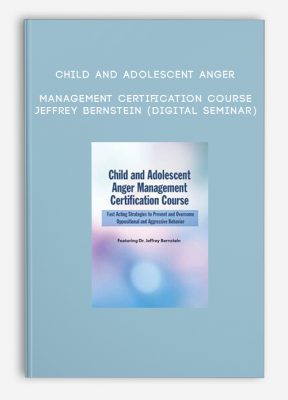
Child and Adolescent Anger Management Certification Course – JEFFREY BERNSTEIN (Digital Seminar)
Description
Today’s children and teens feel overwhelmed, time crunched and stressed out by social media, screen time, and an uncertain and often frightening world. These stressors can lead to frustration and the very natural emotion of anger.
But anger can quickly turn into disrespect, aggression, defiance, and outbursts when young people are unable to cope; sabotaging school performance, peer relationships, and family functioning.
Whether you’re a therapist, educator, counselor, social worker or any professional who works with children and adolescents, it’s essential for you to be properly equipped to work with angry, oppositional and aggressive behavior.
Dr. Jeffrey Bernstein is a licensed psychologist and best-selling author who has worked with over two thousand angry and defiant children and their families over the last 32 years. Dr. Bernstein has appeared on the Today Show and is the author of several publications on anger and defiance.
Watch him in this Online Certification Training as he gives you the high-impact skills, reliable tools and proven strategies you need to help children and teens with anger issues manage this overpowering emotion. Dr. Jeff will give you detailed step-by-step guidance and walk you through specific real-life scenarios related to family, school and peer relationships so you can:
- End power struggles at home and school
- Reduce and prevent angry outbursts, aggression and violence
- Get teens to think and reflect before reacting
- Cultivate emotional intelligence, communication and problem-solving skills
- Help kids trust and value adults
- Offer healthier alternatives to angrily shutting down or lashing out
Best of all, you can become a Certified Specialist in Child and Adolescent Anger Management (CSAM-CA) upon completion of this course – letting families,schools, agencies or your employer know that you’ve taken the time and effort to effectively work with angry, oppositional and aggressive behavior.
Outline:
Neuroscience-based Nuances of Anger in Children and Teens
- How anger is experienced and processed differently in the child and teen brain
- The fight-flight-freeze response and manifestation of anger in children and teens
- The neuroscience of the body-mind cycle of anger
- The threat response and perceived lack of emotional safety
Anger’s Connection to Learning Differences, ADHD, ODD, Anxiety, Depression, Trauma, and More
- The obvious & nonobvious connection between learning differences, ADHD, and ODD
- The mechanisms of anxiety underlying anger
- The link of depression to anger
- Role of trauma in suppressed and expressed anger OCD and anger
- Addictions and anger
How to Create Emotional Safety to Engage Children and Teens About Sensitive Subjects
- Anger, fear, guilt, resentment and shame
- Successful anger management and awareness of underlying thoughts and emotions
- Behaviors at school, peer struggles, body image concerns, and family stressors sparked by underlying negative thoughts and emotions
- Why empathy uncovers and diffuses the underlying thoughts and feelings that drive anger
Myths About Anger and The Mistakes That Come with Them
- The “measure up myth” and other societal pressures that drive underlying negative emotions
- Why and how oppositional children and teens want to be equal to adults
- How perceived violations of fairness become embedded rigid distortions
- How positive emotions are incompatible with forming and holding on to anger
- Self-reflection activity: What have you seen in angry children and teens?
Anger Triggers: Teaching Children and Teens to Tune into What Sets Them Off
- Throwing spaghetti on non-talk kids’ refrigerators and seeing what sticks
- Drawing out the short fuse and long fuse
- Cooking up and digesting an anger triggers pizza
- How to use anger logs and thermometers with children
- Deescalate anger in specific circumstances
- Transitioning off video games
- Homework
- Siblings
- Hearing “no” from parents
Mindfulness and Relaxation Techniques to Let Go of Anger in the Moment
- Reset anger with belly breathing
- Guided imagery to put children and teens in charge of anger
- Squeezing the lemon and other progressive muscle relaxation techniques to maintain control
- Body scan strategies to promote mindful awareness
- Mindful walking with “silly strides” for younger children
Challenge the Dysfunctional Thoughts Behind Anger with Cognitive Approaches
- CBT exercises to help the thinking brain identify, challenge, and reduce negative self-talk
- Putting cognitive restructuring into easy-to-grasp and effective language
- “Talk” and “non-talk” kids – how to get each type to buy into sharing angry thoughts
- Finding acceptance and letting go with “whatever”
- Distraction, the pink giraffe, and other disengagement strategies
Build Optimism, Gratitude, Grit and More with Positive Psychology Approaches to Managing Anger
- Seeing strengths
- Opening up to optimism
- Grabbing some gratitude
- Finding flow
- Gathering hidden grit and gaining it for the future
- Creating an anger success catch book
Assertiveness, Communication and Conflict Resolution Skill Building: Empowering Children and Teens to Problem-Solve Anger
- Assertiveness training techniques
- Communicate anger effectively with “I” statements
- Putting “whatever” to work
- Overcoming the “I Don’t Knows” that silently fuel anger
- Mindful listening, speaking, and messaging
- Social media influence inoculation strategies
- Defuse anger with humor and other conflict resolution strategies
Coaching Parents and Caregivers to Avoid Being Adversarial by Becoming Collaborative
- Looking out for negative labels
- The Pace Car, Chunky Soup, and other metaphors that help teachers and parents
- Why understanding struggling children and teens is just as important as respecting and loving them
- The “Struggle With” Vs “Choose Not” dilemma regarding impulse control
- Self-reflection exercise for participants to use with parents
Strategies for Online Anger Counseling and Educating
- Belly breathing in the house
- Expanding counseling role to teacher, puppeteer, entertainer, and comic
- Using therapeutic card decks and online whiteboards for collaborative drawing and writing
- Balancing parents and siblings popping into view
- Apps, videos, and workbooks to promote home-based anger management
Case Conceptualization and Treatment Planning
- Case study reviews
- Establish short-term and long-term goals to measure success
- Strategies for working with groups
- Self-harm and other harm considerations
- Risks and limitations of anger management approaches for children and teens
NLP online course
So what is NLP?
NLP stands for Neuro-Linguistic Programming. Neuro refers to your neurology;
Linguistic refers to language; programming refers to how that neural language functions.
In other words, learning NLP is like learning the language of your own mind!
NLP is the study of excellent communication–both with yourself, and with others.
It was developed by modeling excellent communicators and therapists who got results with their clients.
NLP is a set of tools and techniques, but it is so much more than that.
It is an attitude and a methodology of knowing how to achieve your goals and get results
Preview Information:
Original Page
Add more Author:
Dr. Jeffrey Bernstein is a psychologist, author, and expert with over thirty-two years’ experience specializing in child, adolescent, couples, and family therapy.
He is the author of seven books: The Anxiety, Depression, & Anger Toolbox for Teens; The Stress Survival Guide for Teens; Mindfulness for Teen Worry; 10 Days to a Less Defiant Child; 10 Days to Less Distracted Child; Liking the Child You Love and Why Can’t You Read My Mind. Dr. Bernstein has also published the Letting Go of Anger Therapeutic Card Deck, a therapeutic card deck widely used by mental health professionals.
Dr. Bernstein has appeared on the Today Show and Court TV as an expert advisor and frequently presents at conferences for school counselors and mental health professionals. He completed his post-doctoral internship at the University of Pennsylvania Counseling Center and holds a PhD in Counseling Psychology from the State University of New York at Albany.
Speaker Disclosures:
Financial: Jeffrey Bernstein maintains a private practice. He is an author and receives royalties. Dr. Bernstein receives a speaking honorarium from PESI, Inc.
Non-financial: Jeffrey Bernstein is a part of the Pennsylvania Psychological Association.
More Course: NLP – HYPNOSIS – PHILOSOPHY
Outstanding Course:Ethical Principles in the Practice of Maryland Mental Health Professionals – ALLAN M.


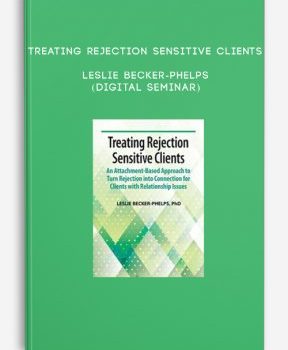
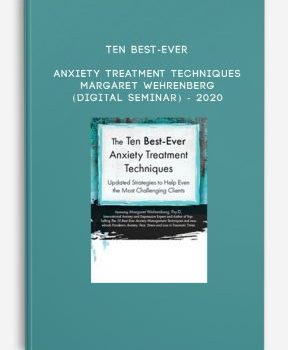


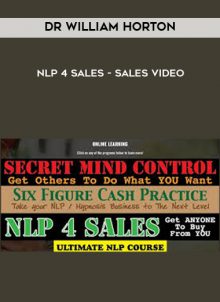


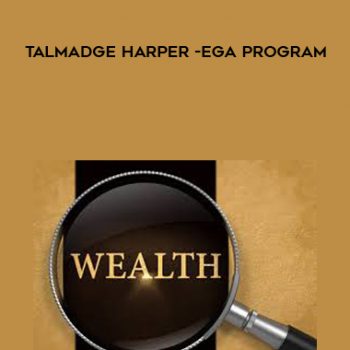
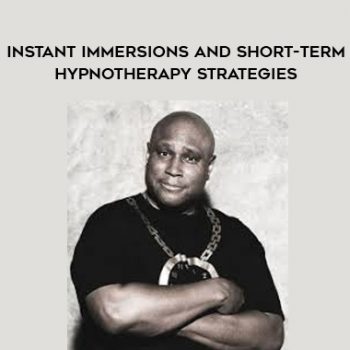

Lord –
This is Digital Download service, the course is available at Coursecui.com and Email download delivery.